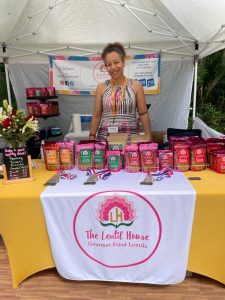Starting a food business might seem intimidating, but UF/IFAS Extension courses can help make big dreams a reality.
That is exactly how Sharlay Smith of Jacksonville, Florida, turned a “lightbulb moment” into The Lentil House, a profitable business that sells a Smith family favorite in Whole Foods stores across the state.
A new adventure
After 10 years as an educator, Smith wanted a new adventure.
“I thought of what I enjoyed doing, but none of those things were appealing to me to do as a business,” she said. “Except for making fried lentils. For me, making lentils was very relaxing. Not only that, but everybody loved my lentils. It’s a favorite family snack.”
At first, Smith put the idea on the backburner, thinking it might not be feasible.
“I thought that I would immediately have to get my product in stores, and I had no idea how to do that,” she said. “I didn’t even originally attend the Extension cottage food course with the intention of starting my own business. It was to support someone else. But once there, a lightbulb went off. I realized I could do this.”
Extension courses provide a launch pad
Smith’s story is one of many success stories around the state. Across Florida, more than a dozen UF/IFAS faculty members support cottage food businesses like Smith’s.

In Florida, a cottage food business is a business that makes less than $250,000 in annual gross sales and is legally allowed to use a home kitchen to produce certain foods for sale, including honey, jams and jellies, bread, nuts and more. While cottage food business owners are not subject to commercial regulation, they need to adhere to guidelines for safe food production, which are taught during UF/IFAS Extension courses.
“A restaurant is just that, a restaurant,” said Amy Simonne, UF/IFAS professor of food safety and quality and resident cottage food expert. “But a home is so many things. Sometimes a home may resemble a hospital with sick people, or it may resemble a day care with kids running around, and we have to teach people how to make sure the food they prepare is safe regardless of their home situation. It is possible to make safe food at home for public consumption and we teach people how to do that.”
The courses also teach people how to build a business that is profitable. Budding entrepreneurs must consider their product, the capacity for it in the market and their customer base. With more knowledge and understanding of what it takes to be successful, attendees were empowered to pivot and improve their chance at success, Smith noted.
“Many times people come to our courses with business ideas, but they do not always have an economic plan behind the idea,” said Simonne. “We see people forget about paying themselves, and they overlook the need for a proper business plan to ensure they are profitable. Cooking something or preparing something for your family is very different from cooking and selling to the public.”

“Reflecting on the economic piece of this is important before you get started,” “You need to study before you jump in, just like you would for anything else. You wouldn’t just jump in the water; make sure you know how to swim,” she added.
While all the information and components may seem overwhelming, Smith noted the course as a major confidence boost and calls it a “one stop shop.”
“You leave the course with all of the things you need except for registering your business with the state,” she said. “As the course went on, I gained confidence and thought ‘ok, I can do this,’”
Since Smith attended the course in 2017, The Lentil House has won numerous national awards and has expanded to become a commercial business as of 2022.
“The learning never ends,” Smith said. “Study for yourself and what others are doing. It does not end when you leave the Extension course. The resource binder the course provides is a Bible, but the learning must continue beyond the course.”
Smith’s greatest tip for success? Mentors.
“I feel like I’ve gotten this far because of mentors,” she said. “I have met other people in the cottage food industry that share what worked for them and what didn’t work and will give suggestions. Social media is a great place to make connections, too.”
For more information on cottage food courses near you, contact your local Extension office.
 5
5
